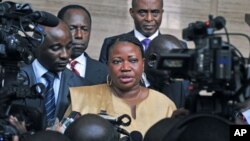The African Union says it will not cooperate with the International Criminal Court arrest warrant for Libyan leader Moammar Gadhafi. Some African leaders mistrust the international court.
The African Union said the arrest warrant against the Libyan leader “seriously complicates” its efforts to find a solution to the conflict.
AU Commissioner Jean Ping said the court is “discriminatory” because it only goes after crimes committed in Africa while ignoring crimes by Western powers in Iraq, Afghanistan and Pakistan.
Gambian jurist Fatou Bensouda, a deputy prosecutor for the International Criminal Court, said Africa's argument against the ICC ignores how many Africans have reached out to the court.
“Anytime I hear this about ICC targeting Africa, ICC doing double justice, it saddens me, especially as an African woman, also knowing that these conflicts, most of these conflicts are happening on the continent of Africa,” she said.
Bensouda said trials of Africans are for Africans because the alleged victims are Africans.
"We say that ICC is targeting Africans, but all of the victims in our cases in Africa are African victims. They are not from another continent. They are African victims and they are the ones who are suffering these crimes," said Bensouda.
The ICC says warrants against the Libyan leader and his son are for crimes against humanity and are meant to ensure that they are brought before the court so they “do not continue to obstruct and endanger the court's investigations.”
In urging its members to disregard the warrants, the African Union again showed how much many of its leaders mistrust the court. The ICC issued an arrest warrant for Sudanese President Omar al-Bashir nearly a year ago, yet he has traveled freely on the continent.
The argument that the court is politically motivated in singling out African leaders was taken up by defense attorney Courtenay Griffiths at the war crimes trial of former Liberian President Charles Taylor earlier this year.
"We submit that it is to the shame of this prosecution that it has besmirched the lofty ideals of international criminal law by turning this case into a 21st century form of neocolonialism. And, I am not apologizing for saying that," said Griffiths.
Griffiths said the International Criminal Court has shown its bias in trying Taylor.
“His trial has been trumpeted by the prosecution as demonstrating an end to impunity. We agree. Indeed, his trial is of importance to Africa and this evolving concept of international justice to which we are, as a defense, unswervingly committed. Yet we note that currently everyone being tried or awaiting trial at the International Criminal Court are from, guess where - Africa. We are disturbed by this,” said Griffiths.
Chief prosecutor Brenda Hollis reminded Griffiths that it was the government in Freetown that asked for the Special Court for Sierra Leone. Hollis said there is a “perverse sort of logic” in Africa's argument against the ICC.
"And, the logic seems to be that unless the heads of African states will create courts or can create courts to punish crimes within their country, even crimes that offend everyone of us as members of the global community, unless they do that, the rest of the world should simply butt out," said Hollis. "Because if they don't do it, then these victims should be left without justice. Somehow they deserve lesser justice. We suggest to you that is not the case."
Taylor is the first African head of state to be tried in person. A verdict in his case is expected later this year.
Thirty-one of Africa's 53 nations are signatories to the Rome Statute establishing the court's authority. That is nearly one-third of the countries where the ICC has jurisdiction. So, if they all disregard the Gadhafi warrant, that further limits the court's reach.
Deputy prosecutor Bensouda said blocking the court protects the abuse of power.
"Why don't we look at the positive side? Why don't we look at the fact that African leaders are taking leadership in international criminal justice? Why don't we say ICC is targeting those who target Africans? Because that is what we are doing," said Bensouda.
ICC chief prosecutor Luis Moreno-Ocampo said it is not the court that decided to investigate Moammar Gadhafi. That decision came from a unanimous resolution of the United Nations Security Council, on which Nigeria, Gabon and South Africa currently sit.
African Union Says ICC Prosecutions Are Discriminatory




